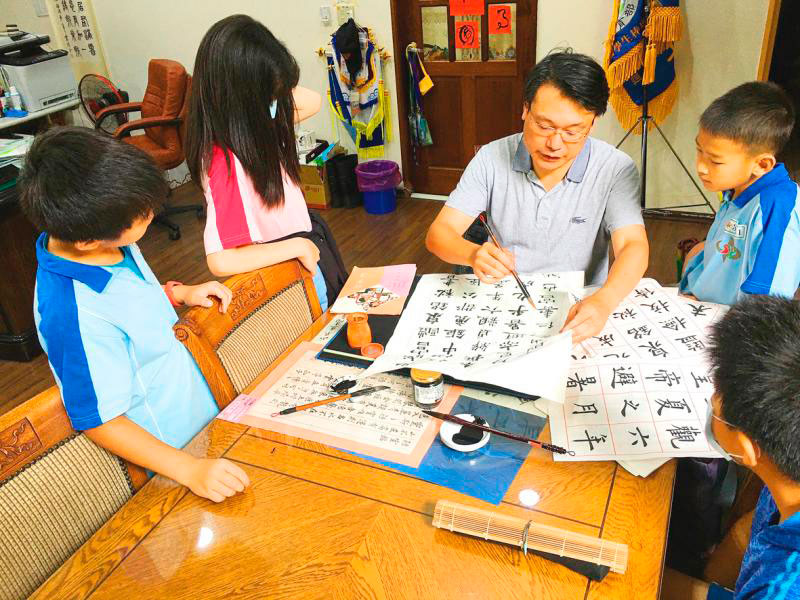
A principal at Jhongping Elementary School in Taoyuan’s Jhongli District (中壢) hopes to calm students’ minds with daily Chinese calligraphy practice.
School principal Liu Yun-chieh (劉雲傑) teaches half-hour-long classes on weekdays to prepare students to learn calligraphy and help them to calm their minds, he said.
“Modern people are too focused on their mobile devices, to the extent that they find no time for anything else,” Liu said.
This has led to sloppy handwriting, even when writing in print with ballpoint pens, he said.
It is sad that schools have phased out the art of calligraphy, which used to be mandatory for elementary-school students, he said.
Another reason he instituted the program was to keep the most unruly students occupied, so that they can learn to calm their minds, if only for a brief moment, by observing, copying and, hopefully, learning to appreciate calligraphy, Liu said.
The program eventually gained a reputation among parents, who began asking if their children could enroll in the class, he said.
“Every stroke of the brush, regardless of what action you make with it, reflects the calligrapher’s nature and emotions,” he said.
Liu, a student of renowned calligrapher Chiang Yu-min (江育民), is proficient in the regular script of Chinese calligraphy and uses Tang Dynasty regular script master Ouyang Xun’s (歐陽詢) Sweet Water Ode at Jioucheng Palace (九成宮醴泉銘) as part of his teaching materials.
Ouyang’s work features many core concepts of the regular script, which could also express other ideas on how to comport oneself in life, Liu said.
“Ouyang’s script is orderly, eschewing flowery script and bearing with it an inner strength, the likes of which can only be recreated through diligence and concentration,” he said.
Many students do not truly appreciate the meaning of “giving it their all” until they try copying Ouyang’s scripts, he said.
A student surnamed Lin (林) said that he was impatient and usually wrote sloppily, as he often could not wait to leave the classroom.
After the course, he said that not only was his handwriting much more legible, but he was also much calmer.
A parent surnamed Lo (羅) said that Liu’s requirements for the class – to put everything in order before they are allowed to begin writing – has encouraged her child to adopt orderly habits.
Source: Taipei Times
